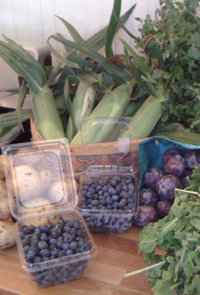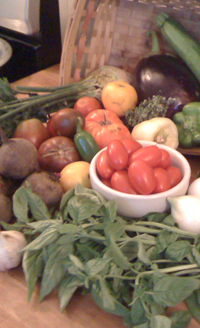9 Honest Answers About Locally Sourced Food
 Dana Cox Lipe is a Chef, Mother, Wife and an outspoken advocate for the consumption of locally sourced food. As a part of Dana’s Honest Meal Project, she spent an entire year eating only foods in which she could track the source of every ingredient to family farms. That meant no restaurants and no grocery stores. Dana has set up the website, www.thehonestmealproject.com to share her experiences and hopes to educate and inspire others to try to live and eat outside of the confines of industrial food production.
Dana Cox Lipe is a Chef, Mother, Wife and an outspoken advocate for the consumption of locally sourced food. As a part of Dana’s Honest Meal Project, she spent an entire year eating only foods in which she could track the source of every ingredient to family farms. That meant no restaurants and no grocery stores. Dana has set up the website, www.thehonestmealproject.com to share her experiences and hopes to educate and inspire others to try to live and eat outside of the confines of industrial food production.
1) Can you tell us a little bit about the Honest Meal Project?
Honest Meal Project is my attempt to make a difference in our food systems. Big Ag’s dominance of our diet seems insurmountable sometimes. It started with a desire to educate people about the origins of their food and asking what I could do as an individual (without legislative power or tremendous financial resources) to make an impact. I decided that to start – I could try and live without industrially-produced food, prove it was possible, and hopefully inspire others to seek out real local food. So I committed to eating only food I could source from family farms for a full year, which I did from Labor Day of 2010 to Labor Day of 2011. It brought about a sort of life renaissance for me, changed my relationship with food, re-ignited the passions that drew me to the food business in the first place. We threw a big harvest dinner open to the public that Fall to celebrate and exposed a few more people to honest food. I think I have my moments of being persuasive with words, but food moves people at their core. Once they taste this food, they’re naturally more open to the message. Last Summer we set up shop in the park and sold locally-sourced salads under the trees to Chicagoans at Green City Market. I want to share what I learned with a broader audience, maybe write the CSA bible or create a show that depicts farmers who have returned to the original ways; we need more young people to grow food as nature intended. I have lots of ideas as to how to add momentum, shed some light…
2) You mention on the Honest Meals website that your experience with industrial agriculture inspired the project, can you explain what that experience was?
 I was on a field trip with my students touring agricultural research facilities, slaughterhouses, feed lots, and farms. Most of the researchers we encountered were proponents of industrial agriculture and seemed to think sustainability, organics/biodynamics and such were fringe, niche interests and didn’t really indicate a desire for change from the masses. Teaching future chefs about more responsible sourcing and urban gardens seemed kind of hollow knowing that the agriculture students were being taught mono-cropping and heavily carbon-reliant techniques (profitable in the short-term, with horrifying long-term consequences). What was happening in the grains business was disturbing enough, but once we saw the details of modern meat production, something sort of snapped in my brain. The way that animals are housed as they gain mass, and the details of how they are put down once they’re at a marketable weight (or no longer productive for milking, for instance) was intolerable for me. I know that we set aside our humanity during the Industrial Revolution towards people for the sake of profit and efficiency. I suppose it’s not beyond imagination that we’d abuse animals for the sake of cheap burgers and bacon, but ignoring a creature’s pain, suffering, or madness because they are a unit of production was so disturbing to me. I sobbed uncontrollably on the train ride home to Chicago thinking about the state of the cows we’d seen in a feedlot. I was so moved and angry and even ashamed to be a chef for a time (knowing that the drive to keep food costs low is a driver for suppliers, which then pressures producers, and so on….). The question that kept me up at night was “But what can I do?” I don’t care for the taste of powerlessness and eventually re-phrased the question to “Hang on, what CAN I do?” The answer at first, was not to participate. I did have power over my own plate!
I was on a field trip with my students touring agricultural research facilities, slaughterhouses, feed lots, and farms. Most of the researchers we encountered were proponents of industrial agriculture and seemed to think sustainability, organics/biodynamics and such were fringe, niche interests and didn’t really indicate a desire for change from the masses. Teaching future chefs about more responsible sourcing and urban gardens seemed kind of hollow knowing that the agriculture students were being taught mono-cropping and heavily carbon-reliant techniques (profitable in the short-term, with horrifying long-term consequences). What was happening in the grains business was disturbing enough, but once we saw the details of modern meat production, something sort of snapped in my brain. The way that animals are housed as they gain mass, and the details of how they are put down once they’re at a marketable weight (or no longer productive for milking, for instance) was intolerable for me. I know that we set aside our humanity during the Industrial Revolution towards people for the sake of profit and efficiency. I suppose it’s not beyond imagination that we’d abuse animals for the sake of cheap burgers and bacon, but ignoring a creature’s pain, suffering, or madness because they are a unit of production was so disturbing to me. I sobbed uncontrollably on the train ride home to Chicago thinking about the state of the cows we’d seen in a feedlot. I was so moved and angry and even ashamed to be a chef for a time (knowing that the drive to keep food costs low is a driver for suppliers, which then pressures producers, and so on….). The question that kept me up at night was “But what can I do?” I don’t care for the taste of powerlessness and eventually re-phrased the question to “Hang on, what CAN I do?” The answer at first, was not to participate. I did have power over my own plate!
3) People will have a hard time wrapping their heads around this: No restaurants or grocery stores for one year. We’re not talking about sticking to the organic section of the store, we’re taking NO grocery stores or restaurants period. Was it difficult dealing with the lack of convenience or were there social pressures that you found problematic as well?
I had to be really conscious about getting through the day, as there wasn’t the option of stopping by the cafeteria or vending machine. I had to pack food and prepare ahead. It was challenging at first, and I had a day or two of fasting because I’d left my lovely farm lunch at home, but it became routine pretty quickly. The social aspect was one of the more difficult aspects of the project. It’s wild how central food and drink are to getting together. I had to be more creative once “Let’s have coffee soon…” was removed from my vocabulary. I “advertised” to friends on Facebook that I wanted to see them and couldn’t eat out, but was willing to cook for them. I’d go to friends’ places with my honest ingredients and cook for them and a few more folks of their choosing. They were great meals I thought, and also an enjoyable way to share the food and philosophy with them. It showed me how powerful sharing this food could be and opened the door to discussion.
4) This surely required you to call food suppliers and question them about food sources, did you meet a lot of resistance from people along the way?
 I more or less eliminated suppliers, as I was buying directly from producers. The way I approached it was to find food I needed, and then research how to get it (join their CSA, go to a farmers market where they vended, see if they’d ship something to me, etc.). I attempted some meals at restaurants that waved the farm-to-table flag, but not everything was as trace-able as their marketing suggested. They probably thought I was a jerk or crazy, but I was just trying to stay true to the project.
I more or less eliminated suppliers, as I was buying directly from producers. The way I approached it was to find food I needed, and then research how to get it (join their CSA, go to a farmers market where they vended, see if they’d ship something to me, etc.). I attempted some meals at restaurants that waved the farm-to-table flag, but not everything was as trace-able as their marketing suggested. They probably thought I was a jerk or crazy, but I was just trying to stay true to the project.
5) The project, no doubt, took a tremendous amount of planning and work on your part, and you proved that one can opt out of industrial food, but what would it take for this approach to be accepted or even viable for everyday food consumption?
I researched for about 3 months before I got started. Initially the sourcing/gathering/cooking seemed like a lot of work, but it got easier the longer I did it, I’d say I invested about an hour a day once I got into the locavore groove. I started to think a few meals ahead, like, if I roasted a chicken on Monday night, I’d pack some for Tuesday’s lunch, and put the bones into stew for a soup Tuesday night. Roasted vegetables could be eaten hot Monday, cold with a dressing for lunch Tuesday, and blended into that soup I mentioned Tuesday night.
Wide-scale acceptance of this kind of lifestyle would take a cultural shift and re-shuffling of priorities. Our must-haves for food sound like a porn title; “Cheap, Fast, and Easy.” We’ve come to expect that food shouldn’t cost much, and should be ready to eat in nothing flat. Adoption of this way of eating will likely represent a larger chunk of one’s income, and you do have to embrace the stove a bit. I realize for much of America, family farm-sourced food is simply cost prohibitive, it’s not always a matter of downgrading the cable package so that you can eat better. There are enormous systemic issues here, our food system is badly broken, and Doritos and Pepsi are much more accessible than organic kale, I get that. But if some household funds can be diverted, a CSA subscription or weekly stop at the farmers market can improve your meals (and life) tremendously. I don’t expect everyone to go whole hog, but whatever incremental change they can make would create a shift, and the rewards are HUGE! My energy skyrocketed when I started to eat this way, I lost weight without trying, and people told me the years were peeling back. Becoming so connected to the source of your food, and creating it yourself really elevates eating in general.
6) As a Chef Instructor were you able to incorporate any of this information or these experiences into your classes and if so, was there any interest from your students?
I did incorporate the project into my teaching. One class that started mid-day would ask, “What was for lunch today, Chef?” I’d describe what I’d eaten and soon realized the visual would be better, so I’d postpone eating and bring the containers with me to show them what I was eating. It really engaged them and fleshed out the idea to see several weeks’ worth of meals over the span of the class. I’d pick up my CSA every Wednesday, and would bring it into class and let them see what March or August produce really looked like in the Midwest. If I had a lot of something, I’d let them taste, too, or bring in a conventionally grown comparison from our storeroom. I think sharing the project with my students brought us closer, because they knew I was “for real,” this wasn’t just a job to me. I won a couple of awards for my work with the HMP, and it was my students who wrote letters on my behalf. A few months into the project students would bring me fish they’d caught, or eggs from their neighbor’s chickens, or wild berries they’d foraged, hoping their offering would fit into the parameters and I’d eat it.
7) Now that you are married and have a baby and not just fending for yourself as an individual, how much has this project become ingrained into your family life? Is this something you’ve been able to continue or is it even more of a challenge now?
Life is certainly different! I met my husband 3 weeks into the project, so he got to experience this from the get-go. He’s also a chef, and is really inspired by the superiority of local ingredients. Saturday mornings at the farmers market were like a regular date (with a purpose) for us early on. There are more moving parts when you’re feeding a family, certainly. I was overwhelmed when I went back to work after maternity leave, never sleeping more than ninety minutes makes the homemade life pretty tough. We’ve had our share of Chinese take-out and cheese and crackers for dinner as new, busy parents. I think that perspective is going to be really valuable, though, in creating real world help for people who want to embrace eating more honestly but don’t have much time to spare. Our son is a poster child for how well a baby can eat if introduced to the right stuff (in utero, preferably). He’ll eat any fruit or vegetable presented to him (he’s seventeen months now). His first foods were purees I made from local produce, and I think that helped to develop his palate in favor of real flavors.
We just relocated, so we’re learning the lay of the land here, but we’ve found the winter farmers market and sources for local pastured eggs, milk, meat, white sweet potatoes, and nuts(!); not exactly grown around Chicago (the setting of my first experience of the Honest Meal Project). We’ll get some raised beds in place behind the house soon and plant a little salad garden. Our lil’ man eats tomatoes like apples; he can pick his own in a few months.
8) You recently moved to St. Louis, MO, and now you have Monsanto in your backyard (Monsanto’s corporate headquarters are located nearby in Creve Coeur). Has this inspired you with what you’re doing now or factored into future plans?
My wheels started spinning when we solidified our plans to come to St. Louis. Being here might add a new dimension to Honest Meal Project, “David moving into Goliath’s ‘hood” could be interesting. I’ve learned so much living the project, and further documenting how to do it could be very valuable to those dismayed by their current options. Beginning the project anew in the shadow of the giant might inspire others to seek out their own local food experience. The only way out of our situation with Big Ag as I see it is to put some dings in their armor. The language of profit is the only one they understand, it is influencing demand, or rather the lack of it that will influence them. I don’t see our government stepping in any time soon…
 In the short term, I’d like to launch Honest Meal Project – Under the Arches and write about the experience for a local publication. Our neighborhood farmers market opens mid-April, so that’s likely show time. I lived my commitment in year one, and spoke to groups as far away as San Diego, but between teaching, running a business, and falling in love, I could’ve done a better job of documenting the experiment. There’s so much education still needed and many people to reach. I’d love to pick up the torch that Michael Pollan has so elegantly forged. He made us aware of what’s happening, I want to really empower people to live this way, be the “every man’s” ag-tivist, the Midwestern chef with the “how” perhaps.
In the short term, I’d like to launch Honest Meal Project – Under the Arches and write about the experience for a local publication. Our neighborhood farmers market opens mid-April, so that’s likely show time. I lived my commitment in year one, and spoke to groups as far away as San Diego, but between teaching, running a business, and falling in love, I could’ve done a better job of documenting the experiment. There’s so much education still needed and many people to reach. I’d love to pick up the torch that Michael Pollan has so elegantly forged. He made us aware of what’s happening, I want to really empower people to live this way, be the “every man’s” ag-tivist, the Midwestern chef with the “how” perhaps.
Long term, my husband and I want to have a farm; be as self sufficient as possible, and invite people to come learn with us. We plan to build an “Old Ways Institute” of sorts and show folks how to grow, cook, and preserve food as it’s been done for millennia.
I’ve got tons of ideas, I just need a producer! Maybe I’ll get in touch with Willie Nelson and pitch a Farm Network to romanticize farming as food TV has done for the restaurant industry; highlight the farmers who look more like rock stars than Norman Rockwell scenes. It’s the noblest profession I believe, farmers are my heroes. They’re getting older; we need more young people to want to live the life. Our first show should focus on local food sourcing and cooking by the seasons, showing the trials and triumphs of eating honestly in the modern world. I’m thinking “Mooning Monsanto” would be a great working title.
9) You have a quote from Benjamin Franklin on your website in which he surmises that, of the three ways that a nation can acquire wealth (war and commerce being two), farming is the most honest because we benefit from “a real increase of the seed thrown into the ground, in a kind of continual miracle.” Can that miracle continue in a nation of factory farms and seed patents?
I believe we still have time to save real food! This is a really pivotal time in human history. People are awakening from their high fructose corn syrup fogs and starting to ask questions. We’ve (literally) lost some serious ground, yes, but there’s so much happening at the grass roots level. People are growing their own food even in inconvenient landscapes, farmers’ CSAs are selling out, and cooking has never been as fashionable as it is right now. Do something where you are with whatever resources you have; grow something edible on your stoop or window sill, or commit to one meal a week from the farmers market. Go to the market with friends or your family, talk to the farmers, plan a meal based on what you find there, and cook and eat together. That kind of experience can’t be marketed in a Styrofoam container. Know that revolution can be delicious!





